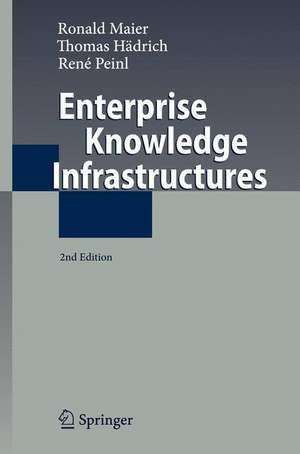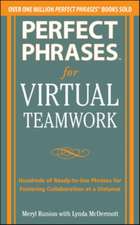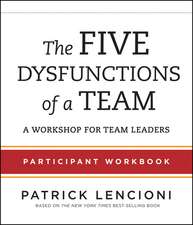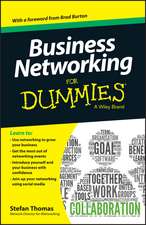Enterprise Knowledge Infrastructures
Autor Ronald Maier, Thomas Hädrich, René Peinlen Limba Engleză Paperback – 2 mar 2009
Preț: 397.59 lei
Nou
Puncte Express: 596
Preț estimativ în valută:
76.08€ • 79.63$ • 63.32£
76.08€ • 79.63$ • 63.32£
Carte tipărită la comandă
Livrare economică 31 martie-14 aprilie
Preluare comenzi: 021 569.72.76
Specificații
ISBN-13: 9783540897675
ISBN-10: 3540897674
Pagini: 460
Ilustrații: XII, 445 p. 82 illus.
Dimensiuni: 155 x 235 x 24 mm
Greutate: 0.64 kg
Ediția:2nd ed. 2009
Editura: Springer Berlin, Heidelberg
Colecția Springer
Locul publicării:Berlin, Heidelberg, Germany
ISBN-10: 3540897674
Pagini: 460
Ilustrații: XII, 445 p. 82 illus.
Dimensiuni: 155 x 235 x 24 mm
Greutate: 0.64 kg
Ediția:2nd ed. 2009
Editura: Springer Berlin, Heidelberg
Colecția Springer
Locul publicării:Berlin, Heidelberg, Germany
Public țintă
ResearchCuprins
Foundation.- Infrastructure.- Integration Services.- Knowledge Services.- Access Services.- Conclusion.
Textul de pe ultima copertă
Success of an organization is increasingly dependent on its capability to create an environment in order to improve productivity of knowledge work. This book focuses on the concepts, models and technologies that are used to design and implement such an environment. It develops the vision of a modular, yet highly integrated enterprise knowledge infrastructure and presents an idealized architecture replete with current technologies and systems. The most important streams of technological development that are covered in the book are communication, collaboration, document and content management, e-learning, enterprise portals, business process management, information life cycle management, information retrieval and visualization, knowledge management, mobile computing, application and network infrastructure, Semantic Web and social software. It includes learning goals, exercises and case examples that help the reader to easily understand and practice the concepts.
Caracteristici
Includes supplementary material: sn.pub/extras















